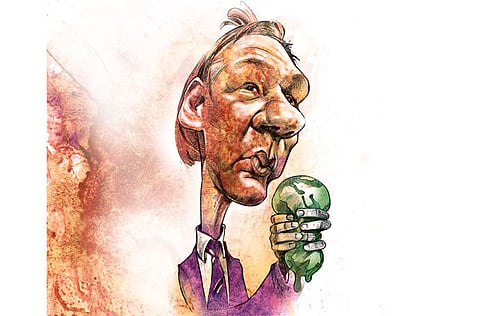Julian Assange: The cryptic campaigner
Assange is described by those who have worked with him as intense, driven and highly intelligent

To his fans, Julian Assange —who is currently out on bail in the UK facing extradition to Sweden on rape charges — is a valiant campaigner for truth. To his critics, though, he is a publicity-seeker who has endangered lives by putting a mass of sensitive information into the public domain.
Assange is described by those who have worked with him as intense, driven and highly intelligent — with an exceptional ability to crack computer codes.
He is often on the move, running Wikileaks from temporary, shifting locations.
He can go long stretches without eating, and focus on work with very little sleep, according to Raffi Khatchadourian, a reporter for the New Yorker magazine who spent several weeks travelling with him.
"He creates this atmosphere around him where the people who are close to him want to care for him to help keep him going.
"I would say that probably has something to do with his charisma."
Those who know him describe a clever, argumentative, driven man. Ethan Zuckerman, an American technology expert, says he is "a crusader, who feels strongly he is on the side of right, and against the forces of evil". But for all his seriousness he is also "a romantic" who "clearly enjoys the way his life now resembles a Bond film".
Assange had spent the previous month masterminding his most daring leak yet from the bar of the Frontline Club, a journalists' haunt near Paddington station in London. Holger Stark, a senior writer with Der Spiegel who worked closely with him (and is writing a book on the WikiLeaks episode) was impressed by his professionalism and unrelenting focus.
Recalling preparations for a previous leak in October, Stark says: "Julian stayed up until 5am to check the files were ready, slept for maybe an hour or so, then headed off for a press conference and dozens of interviews." It was an intensity that blocked out other distractions. He sometimes slept on the floor, often barely at all. He seemed to forget to change clothes, or even to eat. "We went out for dinner in the middle of all this," Stark says, "and he had only a single ice cream."
The storm over the diplomatic cables capped a remarkable year for WikiLeaks that also saw the release of thousands of documents relating to the wars in Afghanistan and Iraq. But for Assange it also represented something of a comeback. He had published more than 1 million documents in four years, revealing everything from Kenyan corruption to Sarah Palin's private e-mails. Yet in spite of growing notoriety, at the end of 2009 he was downhearted — especially at how few leaks turned into major news events.
Julian Assange has been reluctant to talk about his background, but media interest since the emergence of Wikileaks has given some insight into his influences.
He was born in Townsville, Queensland, northern Australia, in 1971, and led a nomadic childhood while his parents ran a touring theatre.
He had a child at 18, and custody battles soon followed.
The development of the internet gave him a chance to use his early promise at maths, though this, too, led to difficulties.
In 1995 he was accused with a friend of dozens of hacking activities.
Though the group of hackers was skilled enough to track detectives tracking them, Assange was eventually caught and pleaded guilty.
He was fined several thousand Australian dollars — only escaping prison on the condition that he did not reoffend.
He then spent three years working with an academic, Suelette Dreyfus, who was researching the emerging, subversive side of the internet, writing a book with her, Underground, that became a bestseller in the computing fraternity.
This was followed by a course in physics and maths at Melbourne University, where he became a prominent member of a mathematics society, inventing an elaborate maths puzzle that contemporaries said he excelled at.
He began Wikileaks in 2006 with a group of like-minded people from across the web, creating a web-based "dead-letterbox" for would-be leakers.
"[To] keep our sources safe, we have had to spread assets, encrypt everything, and move telecommunications and people around the world to activate protective laws in different national jurisdictions," Assange told the BBC earlier this year.
Daniel Schmitt, a co-founder, describes Assange as "one of the few people who really care about positive reform in this world to a level where you're willing to do something radical to risk making a mistake, just for the sake of working on something they believe in."
Wikileaks has published material from a number of different countries, but really hit the headlines in April, when it released video taken from a US helicopter in Iraq in 2007. The images, carried by media outlets around the world, caused widespread shock.
Assange emerged into the spotlight to promote and defend the video, as well as the massive releases of classified US military documents on the Afghan and Iraq wars, in July and October.


